
It’s February 2028. A catastrophic winter storm has paralyzed New Brunswick, Quebec, and Eastern Ontario, surpassing even the devastation of the Great Ice Storm of 1998. Over 120 millimetres of freezing rain have fallen in just 100 hours, encasing the region in ice and disarray. Roads are impassable. Cell service is down. Power grids have collapsed, with full restoration expected to take weeks.
This was the scenario confronting students in Professor David Matyas’ new Law of Disasters and Emergencies course. Designed as an immersive, experiential learning opportunity, the course pushes students beyond the traditional classroom experience—challenging them to anticipate legal complexities, adapt under pressure, and make critical decisions in real time.
The course unfolds along two parallel tracks: one focused on substantive law, the other on a practical simulation. On the first day of class, students are divided into four mock law firms—a medium-sized family law firm, a small private law firm specializing in torts and property law, an established criminal law firm, and a national corporate/commercial firm.
“Students step into the role of firm partners,” explains Prof. Matyas. “They conduct hazard and vulnerability assessments, build risk-planning scenarios, and develop contingency plans tailored to the size, location, and staffing of their firms. They have to think about their staff, their clients, the courts, and other professionals and services with whom they interact. It all leads up to a two-day, end-of-semester simulation where they’re forced to ‘lawyer’ their way through a novel disaster. How well they do depends largely on the strength of the plans they’ve built.”
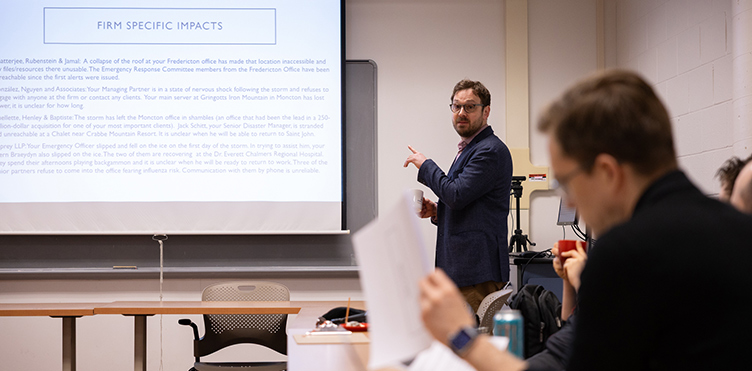
When students begin the simulation, they know nothing about the disaster scenario ahead. The first wave of challenges they face are internal to the day-to-day operations of their firms. How do you function without power? What happens when servers are inaccessible and client files are inaccessible? How do you communicate with clients and colleagues when mobile phones are suddenly unavailable? In an instant, the basic infrastructure of legal practice is thrown into chaos, and students must figure out how to adapt.
From there, students begin to face external challenges. “We saw this play out acutely during COVID-19—courts were forced to change their operating procedures, issuing novel practice directives related to, for instance, social distancing, online hearings, and electronic filings,” shares Prof. Matyas. “Students may have heard about these issues in the abstract, but the simulation forces them to confront the complexity and urgency of running a legal practice while court procedures are rapidly changing.”
As the simulation unfolds, new developments emerge that require students to engage with substantive areas of law. Clients come to them with urgent legal questions, and ultimately, they must plead those issues before a judge in a mock courtroom.
“We had a scenario for the torts law firm involving a property development on Fredericton’s north side,” Prof. Matyas shares. “With the freezing rain causing ice jams on the Saint John/Wolastoq River, the city planned to divert floodwaters away from downtown Fredericton, which would have put those properties at risk. The firm representing that area was asked to bring a motion for an interlocutory injunction to stop it. The family law firm faced a case where one spouse sought an emergency protection order due to domestic abuse. Meanwhile, the corporate-commercial firm wanted a provision within one of their contracts declared a force majeure. Each firm dealt with distinct, substantive legal challenges tailored to the kinds of clients they represented.”
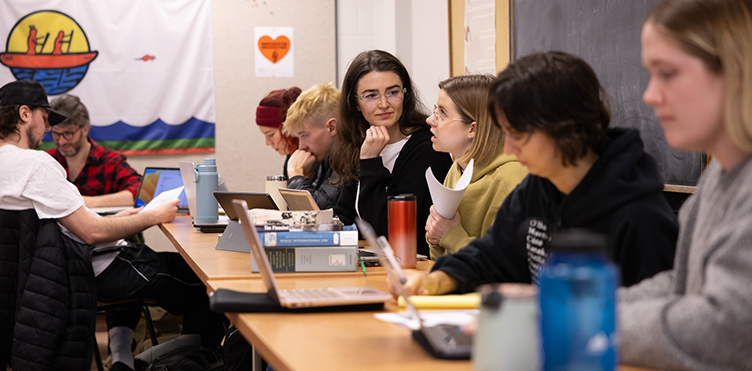
Prof. Matyas was particularly impressed by the collaborative mindset students brought to the simulation, an approach he had emphasized throughout the course.
“It was fascinating to watch,” he says. “Several of the mock firms formed reciprocal partnerships so that, in the face of the emergency—and with careful attention to their professional and ethical obligations—they could share resources and infrastructure. This was exactly the kind of thinking we encouraged in class: to learn from one another, to borrow ideas, and to recognize that in a crisis, it’s not only okay, but often essential, to look to what your peers are doing.”
On day two of the simulation, things got even more challenging when the federal government declared a state of emergency. Students, who were in the midst of responding to client questions, had to shift their focus to the operation of the Emergencies Act. All four law firms were retained collectively by the provincial government to challenge the declaration of the Act in front of a judge (played by the Faculty’s own Prof. Maria Panezi)
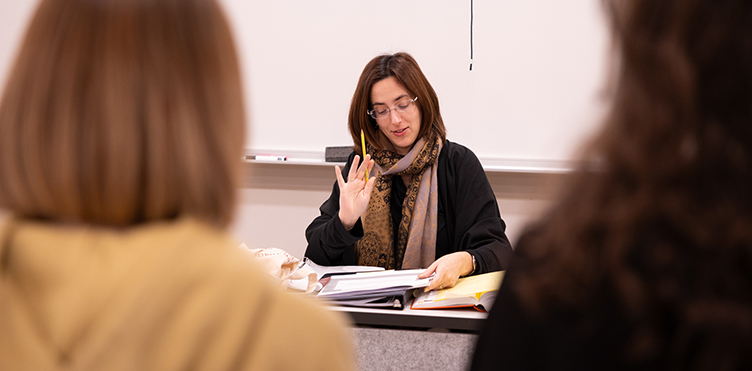
“We did a deep dive over several lectures into the different provisions and the operation of the Emergencies Act, classic statutory interpretation,” explains Prof. Matyas. “But suddenly, through the simulation, they are reading the same provisions with whole new eyes, and an intensity completely distinguishable from how they first read those provisions. It was great fun to watch.”
For third-year student Marina Luro (JD’25), the simulation—and the course more broadly—transformed her understanding of how law intersects with disasters and emergencies.
“I learned that it is not just about humanitarian and government action,” she shares. “There are everyday private law issues, such as tort and property, that play a critical role during a crisis. It also taught me that the law isn't always about responding but also preparing ahead of time and addressing underlying structural vulnerabilities in society to help mitigate the harm caused by crises. I was most surprised by how much space there is for the law and legal professionals in disaster response—the myriad ways that lawyers can help mitigate effects to communities they serve and help respond when disasters occur.”
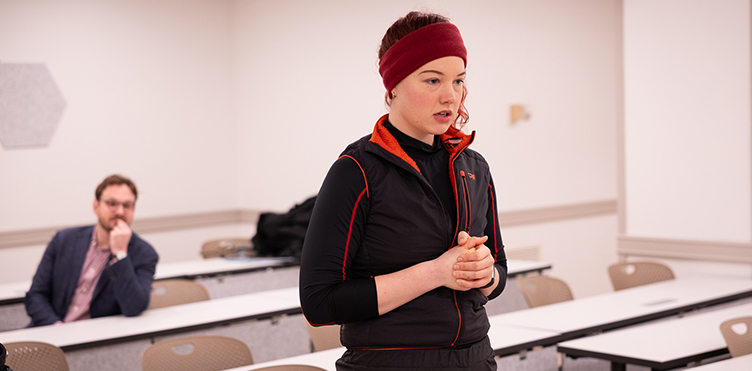
Jacob Powning (JD’25) was drawn to The Law of Disasters and Emergencies due to his background as a volunteer firefighter.
“I’ve been involved on the ground when people’s lives are radically disrupted by unexpected events,” he says. “I was interested in understanding the law that enables emergency responses. It made it clear that it is not just the law in these circumstances but the operation of firms and courts during an emergency that matters.”
Reflecting on the broader implications of what he learned, Powning emphasized the importance of preparedness grounded in legal continuity. “For me, it became clear that in order to be truly prepared for emergencies, including international security breakdowns, we need to normalize all manner of possible disasters as a cyclical part of life so that we are in the best position to deal with them without needing to suspend the rule of law.”
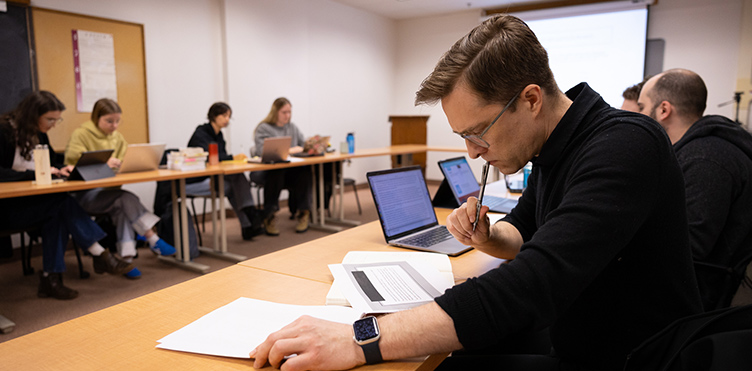
The inspiration for the course grew out of Prof. Matyas’s own experience working as a technical advisor on disaster resilience for a humanitarian organization. When he eventually transitioned into law, he began to see clear connections between the two fields.
“I started noticing overlaps between these worlds, and ultimately opportunities where a risk-centred outlook could help law students prepare both substantively and operationally for the disasters and emergencies of the future,” he explains. “We’re living in a moment of environmental and geopolitical stress—one that is trending toward greater precarity. Law has a significant role to play in these challenges. I wanted to develop a course that would help students anticipate those risks, prepare for them, and respond with clarity and purpose.”
Outside of the simulation, the course lectures aim to equip the students with a broad and critical understanding of the laws of disasters and emergencies. In addition to his own lectures, Prof. Matyas welcomed several guest lecturers engaged in the study and practice of disasters and emergencies. These guests included UNB Law’s own Prof. Benjamin Perryman—who gave a lecture on the Canadian constitutional framework for responding to emergencies—Misha Boutilier—a former counsel from the Public Order Emergency Commission—Brandon Chung—who represented the Canadian Civil Liberties Association in one of the cases that followed the Government’s emergency declaration—and Prof. Payam Akhavan—this year’s Ivan C. Rand Memorial lecture, who joined the class for a fireside chat about climate change litigation before international tribunals.
For Prof. Matyas, the course works to bring the content of these lectures to life through simulation.
“It’s something I think a lot about with my teaching—how to create opportunities for play, and the relationship between play and pedagogy. What I love about the simulation is that it creates this space outside the ‘ordinary life’ of the lectures, but that absorbs students intensely in themes, puzzles, and constraints that feature centrally within those lectures.”
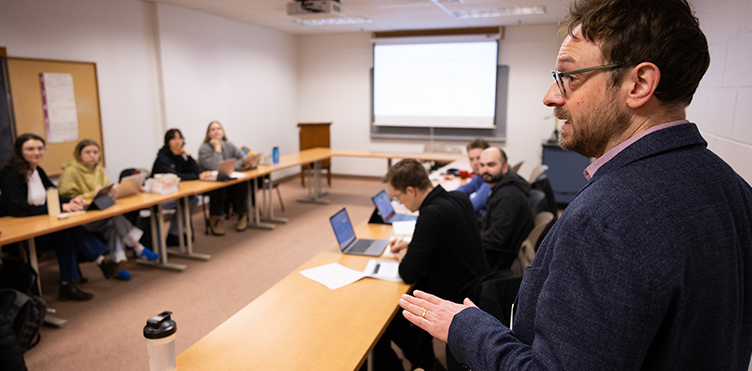
Ultimately, the course equips students not only with legal knowledge but with practical tools—and the confidence to use them in unpredictable, high-pressure situations.
“As lawyers, our students are going to have a key role to play in engaging with the legal and operational challenges of the disasters and emergencies of the future,” Prof. Matyas observes. “This course is a recognition that disasters aren’t just theoretical—they will shape the legal landscape our students inherit. We’re looking to equip our graduates with the competencies to lead through those challenges.”